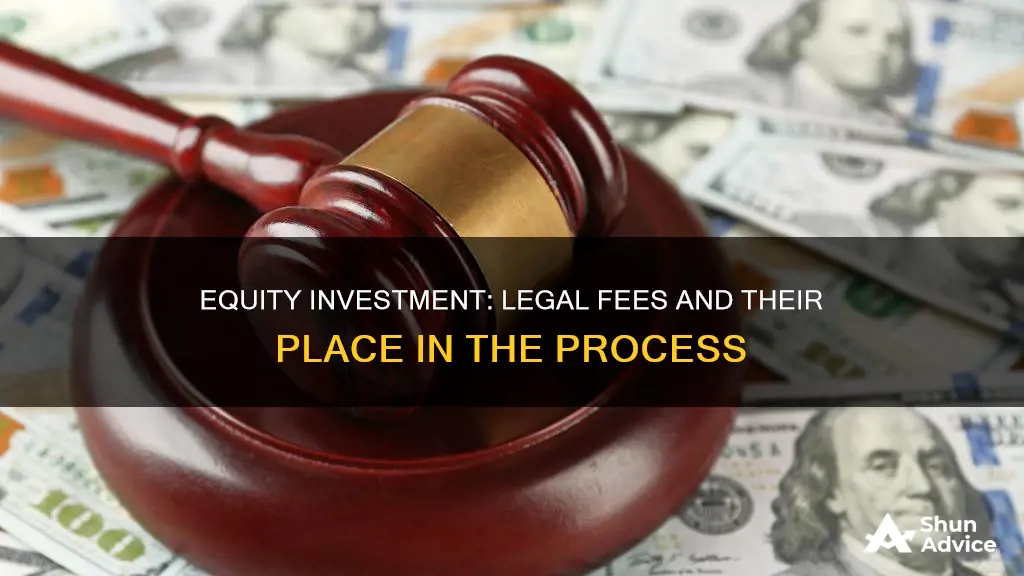
Whether legal fees can be included in equity investment depends on the nature of the legal fees and the type of equity investment. Direct transaction costs, such as legal fees, incurred by an investor to acquire an equity method investment can be included in the initial measurement of the investment. However, legal fees related to financing the acquisition of an equity investment, such as debt or equity issuance costs, are not considered direct costs and are accounted for separately. In the context of venture capital and startup funding, it is common for investors to include a clause in the term sheet that states that the company will bear the legal expenses of the investor, although some investors choose to pay their own legal fees. From an accounting perspective, there are different treatments for legal fees depending on the specific circumstances and applicable accounting standards, such as GAAP or IRS guidelines.
What You'll Learn

Legal fees are part of the cost of an equity investment
In the context of Series A Funding, there are differing opinions on how to account for legal fees. Some professionals suggest expensing the legal fees, while others recommend capitalizing them and netting them against Additional Paid-In Capital (APIC). The approach taken may depend on factors such as the completion of the offering, compliance with SEC or IRS guidelines, and the nature of the entity as a start-up or established company.
It is worth noting that investors should ideally bear their own legal expenses, as the work performed by investor counsel protects their interests rather than the company's. However, investors often include a clause in the term sheet for the financing that stipulates the company will cover their legal and due diligence expenses up to a certain amount. This practice can lead to higher costs and is not always in the best interest of the company.
When evaluating the equity investment at risk, it is important to consider factors such as the participation in profits and losses, the source of funding for the equity investment, and any fees or reimbursements associated with the investment. These factors can impact the determination of whether an equity investment qualifies as equity at risk and should be carefully analyzed.
Becoming an Investment Manager: UK Pathways and Steps
You may want to see also

Whether to expense or capitalise legal fees depends on the context
In the case of a debt offering, legal fees can be expensed. If the company is not intending to follow SEC accounting standards, it is possible to follow IRS guidelines, which allow for booking the net amount raised to the debt or equity section.
Legal fees incurred to defend patent infringement lawsuits can be classified as ordinary and necessary business expenses. However, legal expenses incurred to prepare notice letters for the same purpose must be capitalised as they are necessary to obtain approval from the relevant government agency.
When acquiring an equity method investment with cash, the investor should recognise the equity method investment when they acquire both the common stock and the ability to exercise significant influence. The initial measurement of the equity method investment should include the cost of the investment itself and all direct transaction costs incurred by the investor. Direct transaction costs include out-of-pocket costs directly associated with the acquisition of an investment, such as legal fees. All costs that are not directly associated with the acquisition of an investment, including all internal costs, should be expensed as incurred.
Portfolio Investments: Developing Countries' Failure
You may want to see also

Company vs investor-paid legal fees
When it comes to company vs investor-paid legal fees, there are a few things to consider. Firstly, it is common for startups to pay the legal fees of their investors, even though it may seem counterintuitive. This is because investors often require legal assistance to review legal documents, conduct due diligence, and close the transaction. While it may be frustrating for a startup to use their investment funds to pay these fees, it is important to remember that this is an industry norm and fighting it may not be worth the effort.
From the investor's perspective, they may not want to pay their legal fees because it could reduce their salaries or be seen as taking money out of their own pockets. Additionally, legal fees are variable expenses that are difficult to include in a budget, and investors may want to avoid the appearance of using fund management fees for legal diligence.
Startups should also be mindful of the potential impact on their equity. If the investor's legal fees are a large percentage of the investment, the startup could end up giving away a significant chunk of their company. To avoid this, startups can negotiate a cap on their contribution to the investor's legal bill or increase the investment amount to cover the legal fees.
When it comes to accounting for legal fees, there are a few options. Startups can choose to expense the fees or treat them as a contra equity account. If following SEC accounting standards, specific incremental costs directly attributed to an offering of securities can be deferred and charged against gross proceeds. On the other hand, if a company is not intending to go public or be acquired by a public entity, they may follow IRS guidelines, which may allow for booking the net amount raised to the debt or equity section.
In summary, while it may be frustrating for startups to pay their investor's legal fees, it is often an industry norm that is difficult to change. Startups should focus on negotiating caps or adjusting investment amounts to minimise the impact on their equity and ensure that legal fees do not consume a large portion of their investment funds.
Startup Investment Strategies in India: A Guide
You may want to see also

Equity investment at risk
Equity investments are a high-risk venture where investors are fully exposed to the economic risk of the issuing company. The value of equities is volatile and may fluctuate significantly over a short period, and there is no guarantee of income. In the worst-case scenario, you may lose up to 100% of your investment if the issuing company fails.
Market risk in equity markets can be influenced by macroeconomic factors or factors specific to the issuer. The value of equity shares and the dividends they distribute are determined by the financial performance of the issuing company. However, they can also be influenced by the performance of similar companies in the same sector, takeover activity, social or governmental issues in the home country of the corporation, and financial analysis recommending investors to undertake a specific course of action (e.g. buy, sell, or hold).
There are several specific risks associated with private equity investing, given the inherently illiquid nature of the investments and the need to lock up capital for several years. Operational risk, funding risk, liquidity risk, market risk, and capital risk are the five key risks.
Operational risk refers to the potential for loss due to inadequate processes and systems supporting the organisation. Funding risk is the risk that investors are unable to provide their capital commitments, and liquidity risk refers to an investor's inability to redeem their investment at any given time. Market risk in private equity investments is subject to infrequent valuations, typically done quarterly and with some subjectivity. Finally, capital risk refers to the possibility of a realised loss of the original capital at the end of a fund's life.
Overall, equity investment is a risky venture with potential for significant loss, and investors need to be aware of the specific risks associated with this type of investment.
Rebalancing Investment Portfolios: Yearly Refresh for Optimal Returns
You may want to see also

Equity method of accounting
The equity method of accounting is a technique used to record the profits earned by a company through its investment in another company. It is generally used when a company holds significant influence over the company it is investing in. This usually means owning 20% or more of the company's stock, but it can also refer to having the ability to exert power over another company through representation on the board of directors, involvement in policy development, and the interchanging of managerial personnel.
The investment is initially recorded at its historical cost, and adjustments are made based on the investor's percentage ownership in net income, loss, and dividend payouts. The net income of the investee company increases the investor's asset value on their balance sheet, while the investee's loss or dividend payout decreases it.
The equity method acknowledges the substantive economic relationship between two entities. The investor records their share of the investee's earnings as revenue from investment on their income statement. For example, if a firm owns 25% of a company with a $1 million net income, the firm would report earnings from its investment of $250,000 under the equity method.
When an investor company exercises full control—generally over 50% ownership—over the investee company, it must record its investment using a consolidation method. In this case, all revenue, expenses, assets, and liabilities of the subsidiary would be included in the parent company's financial statements.
On the other hand, when an investor does not exercise full control or have significant influence over the investee, they would record their investment using the cost method. In this situation, the investment is recorded on the balance sheet at its historical cost.
Protecting Equity Investments: Lawsuit Shield Strategies in Texas
You may want to see also
Frequently asked questions
This depends on the nature of the company and the transaction. If the company is a startup, it is common to expense legal fees. However, if the company is intending to follow SEC accounting standards and go public, legal fees associated with equity investments should be included in the cost of the investment.
VC funds have the ability to pay for their own expenses, and the work performed by investor counsel protects the interests of the investor, not the company. Manu Kumar, founder of K9 Ventures, believes that investors should pay their own legal expenses and that it is ridiculous for companies to be charged for investor legal costs.
Direct transaction costs include appraisal fees, legal and consulting fees, and finder's fees. These are generally out-of-pocket costs directly associated with the acquisition of an investment and paid to third parties.
"Equity at risk" refers to equity investments that participate significantly in the profits and losses of an entity. It does not include equity interests that are exchanged for subordinated interests in other Variable Interest Entities (VIEs) or amounts provided to the equity investor by the entity or other involved parties.
Series "A" legal fees can be accounted for in different ways depending on the company's preferences and specific circumstances. Some companies choose to expense the legal fees, while others may include them as a separate account on the Balance Sheet or classify them as an intangible asset.







